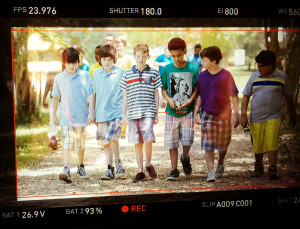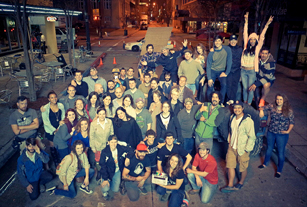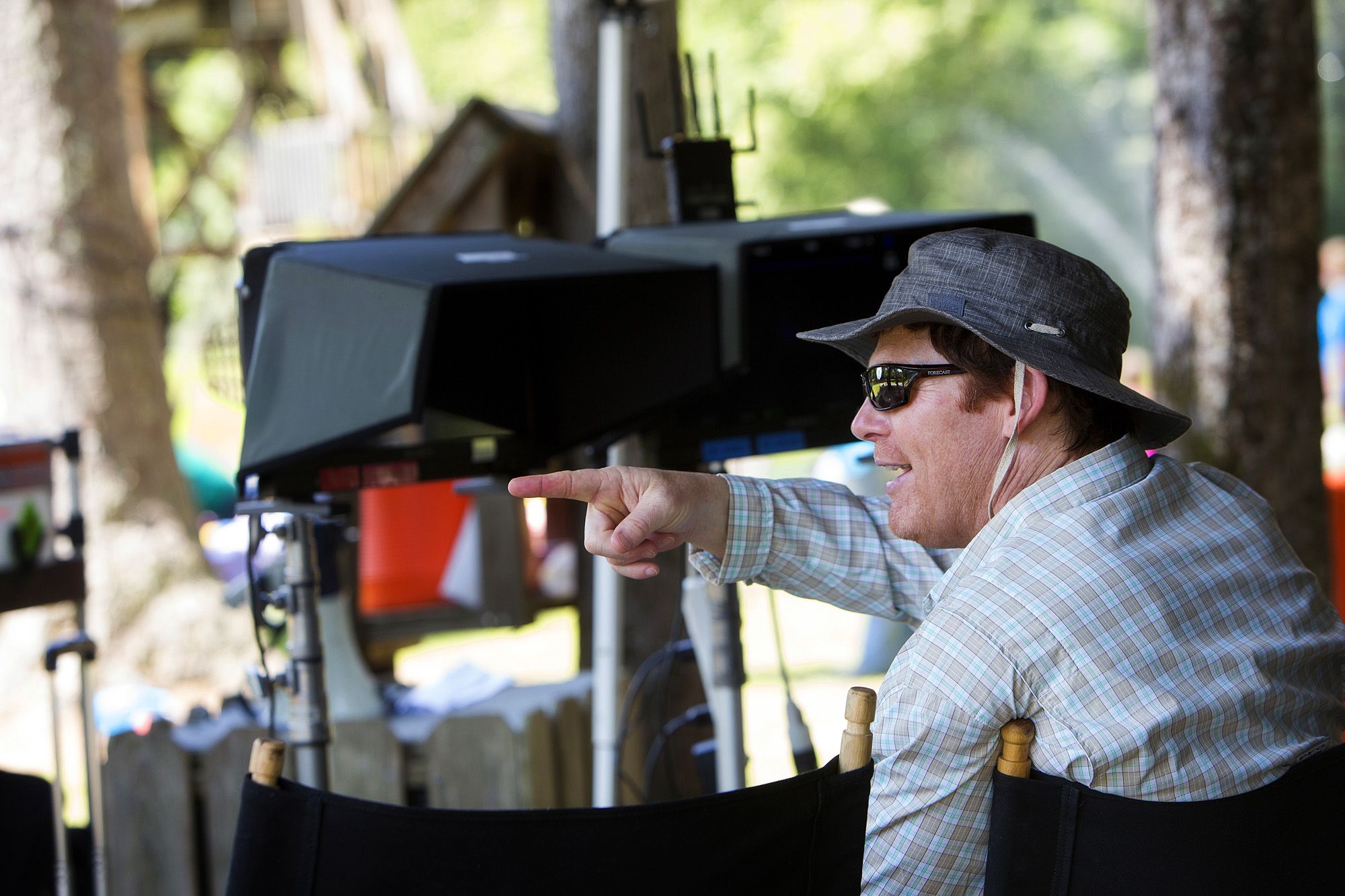Jarred Coates: Making movies that matter
Photo by Collin Richie
Like a big-screen superhero, filmmaker Jarred Coates’ ambitions go beyond the box office to changing the world
For film producer Jarred Coates, the question is not so much “How can art imitate life?” as it is “How can art motivate it?”’
Long before adventuring through all manner of visual storytelling with Red Entertainment Group, his Baton Rouge-based production company, the 45-year-old father of three was exploring the mission field.
Throughout his 20s and 30s, the Red Stick native’s work with the locally based Living Waters ministry and as an associate pastor in Memphis read like an atlas of evangelical enthusiasm: Russia, South America, Europe. There were summer camps, inner city outreach projects, and more than a handful of dangerous walks into the wild of cultures unknown.

Now, about a decade after first funneling his faith into a film career, Coates is coming off a big wave of mainstream success as co-producer of the atheism-vs.-theism lightning rod God’s Not Dead and is poised with a project designed to confront one of society’s ugliest truths: the rampant proliferation of human trafficking.
The film, called Caged No More, is part one of a planned trilogy; to coincide with Human Trafficking Awareness Month, it will hit theaters in January of next year.

“It’s not going to be a Taken where you see some really gut-wrenching stuff,” Coates says. “It’ll be something parents can show their kids. Something a family can watch together and discuss. It’ll be a talking point.”
Defined as the illegal movement of people, typically for the purposes of forced labor or commercial sexual exploitation, the U.S. Department of Homeland Security estimates human trafficking to be a $32-billion-per-year industry worldwide.
According to the National Human Trafficking Resource Center, more than 18,000 cases have been reported since 1996, and the center’s hotline receives an average of 100 calls each day.
Coates’ link to the issue came a few years ago when Laura Domingue, co-founder of Trafficking Hope and Hope House of Louisiana, connected Coates and director Lisa Arnold with author Molly Venzke, who had fictionalized the harrowing tales told to her by survivors of the modern sex trade to create her novel Caged. The film adaptation quickly followed suit.
God’s Not Dead star Kevin Sorbo, famous for his role in Hercules: The Legendary Journeys, takes the lead again in Caged No More, though the film’s creators say they see the project less as a movie and more a movement. Coates doesn’t want Caged No More to spawn a catchphrase but instead a hashtag: #NoMore.

“We want it to stir awareness and education,” says Domingue, who along with husband Lee helped move the film from page to screen and galvanized a vast network of anti-sex-trafficking organizations to lend support to the Caged campaign. The crusade now includes TV host Kathie Lee Gifford, whose daughter stars in the film. “Sometimes you have to stir and poke people into action,” Domingue says.
Arnold is a veteran actress and movie producer who left Pure Flix, one of the biggest players in the Christian Hollywood game, to help grow the faith-based film industry in the Bayou State with her own company, Check the Gate Productions. She met Coates in 2006, and they have since collaborated on several films that tackle spiritual and philosophical issues and social injustice. There’s very little reason to make films other than those, Arnold says.
“Jarred and I always look for that extra calling with a project,” she says. “Human trafficking is slavery that exists today.”
Coates has been at the flashpoint of a controversial conversation before, of course. A year ago, God’s Not Dead blasted from a little-known $2-million picture to raking in nearly $61 million in five months at the box office. It became the stuff of headlines and Bible-study bullet points across the country.
Coates served as the line producer for the project, which was filmed in Baton Rouge. That means he was the boots on the ground responsible for hiring and firing crew, contracting with local vendors, securing locations, establishing the budget, and making sure everyone stuck to it.
“God’s Not Dead was in rough shape when we first saw the script,” Coates admits. “I mean, 120 pages, 65 locations—it was massive and pretty dry. There was a lot of work to do. Credit to Kevin [Sorbo] and Shane [Harper], who brought that debate to life.”
Coates and his crew pulled it off and even helped save the production money by figuring out ways to make Pennington Biomedical Research Center double for the classrooms and hallways of LSU.
“I really appreciated everyone’s easy-yet-professional attitude,” says God’s Not Dead actress Lucy Faust. “It was a low-stress atmosphere. When the atmosphere on a set is like that, it really helps me do my work well because there aren’t distractions of our superiors being stressed out or wound up.”
Though God’s Not Dead was a massive financial success, Coates’ payoff has been of the less tangible but still rewarding variety.
“We didn’t own any of it, so we didn’t get any paychecks on the back end, but it did open a lot of doors for future projects,” Coates says. “And I received calls and emails from all over telling me how much that film meant to people. That was amazing.”
While the Caged series is preparing to launch, Coates and Arnold are using this newfound clout in the faith-based film industry to take things one step further with Film Incito, their new shingle. Through it, they hope to brand “inspiring films” in the same way moviegoers would discuss genres like action, comedy or drama.

Up next for Coates is the production of the largely autobiographical coming-of-age film Camp Cool Kids, as well as a secretive larger project he’s striving to get financing for that he says could be a “nation-shaker.”
“We’ve been in the trenches together,” says award-winning local film director Richie Adams, founder of River Road Creative. “Jarred’s such a warm, likable person who respects his crews. And he’s so prolific right now—pumping them out.”
Indeed, it’s the consistent, camaraderie-filled work of Red Entertainment’s crews that is winning over directors and movie studios.
“The crew he hires—and they are a lot of the same people from project to project—is an enthusiastic, tight-knit group,” says Tom Simes, director of the Coates-produced Gracia, which filmed last year at Episcopal High School. “And he did a lot of ministry work first, so that part I liked. On one level he’s laid back, a good ole boy from the South, but he’s got a fire in his belly. He likes to make films that make a difference.”

That difference extends to his own family, where Coates relishes the fact that he can bring his two sons and daughter on set and show them firsthand a creative trade in the town he grew up in. As a young child in Baton Rouge, he had never dreamed that making movies here would be possible.
For Coates, every project provides a lesson, and through it all his work remains less about the medium and more about the message.
“With film you can put something out there that can reach so many people,” he says. “Looking back on a project, it is so rewarding that all the blood, sweat, tears and daggers you received while making it were worth it because of the impact the film had.”
Get updates on Caged and Film Incito and additional information on human trafficking.












